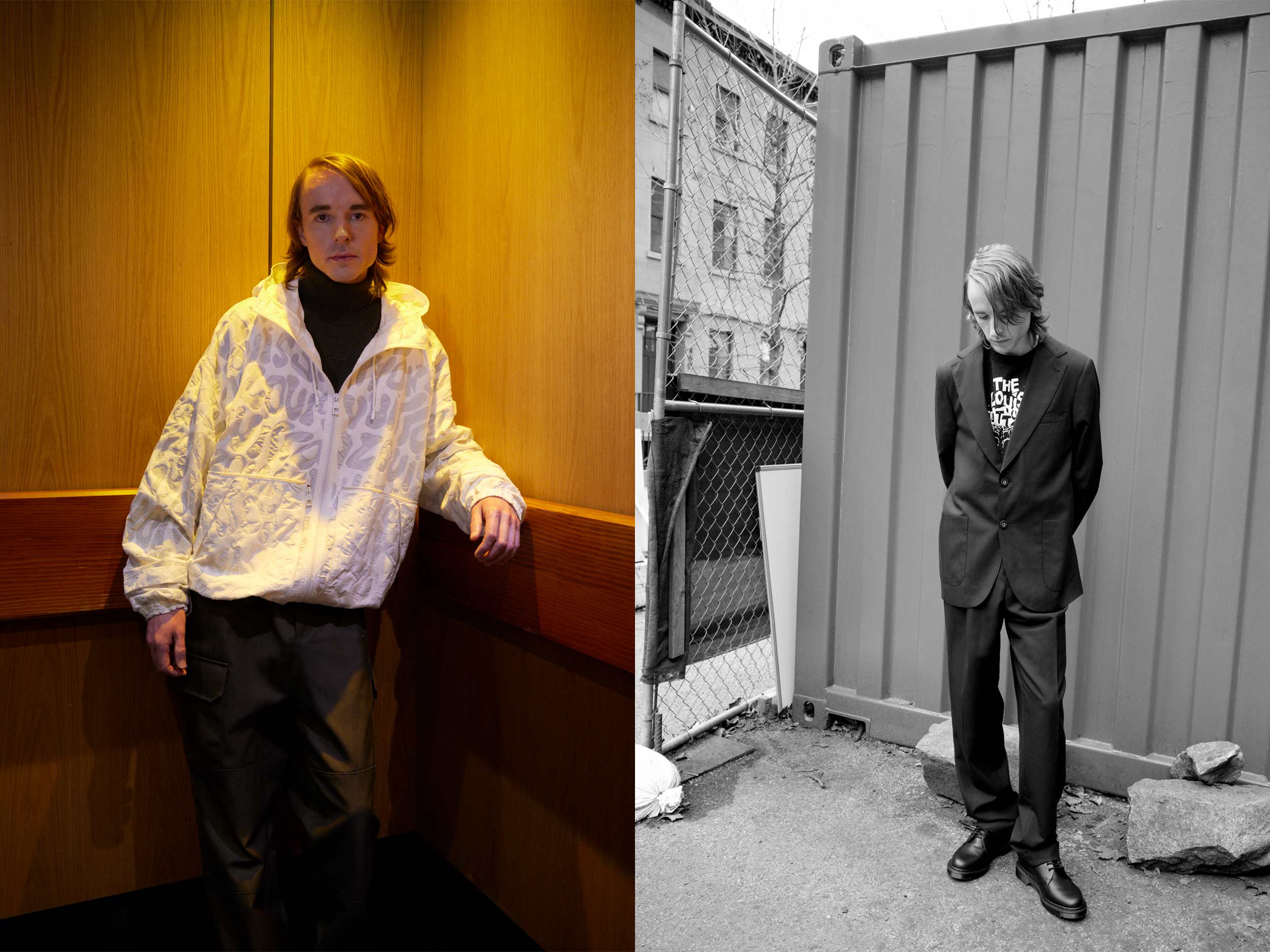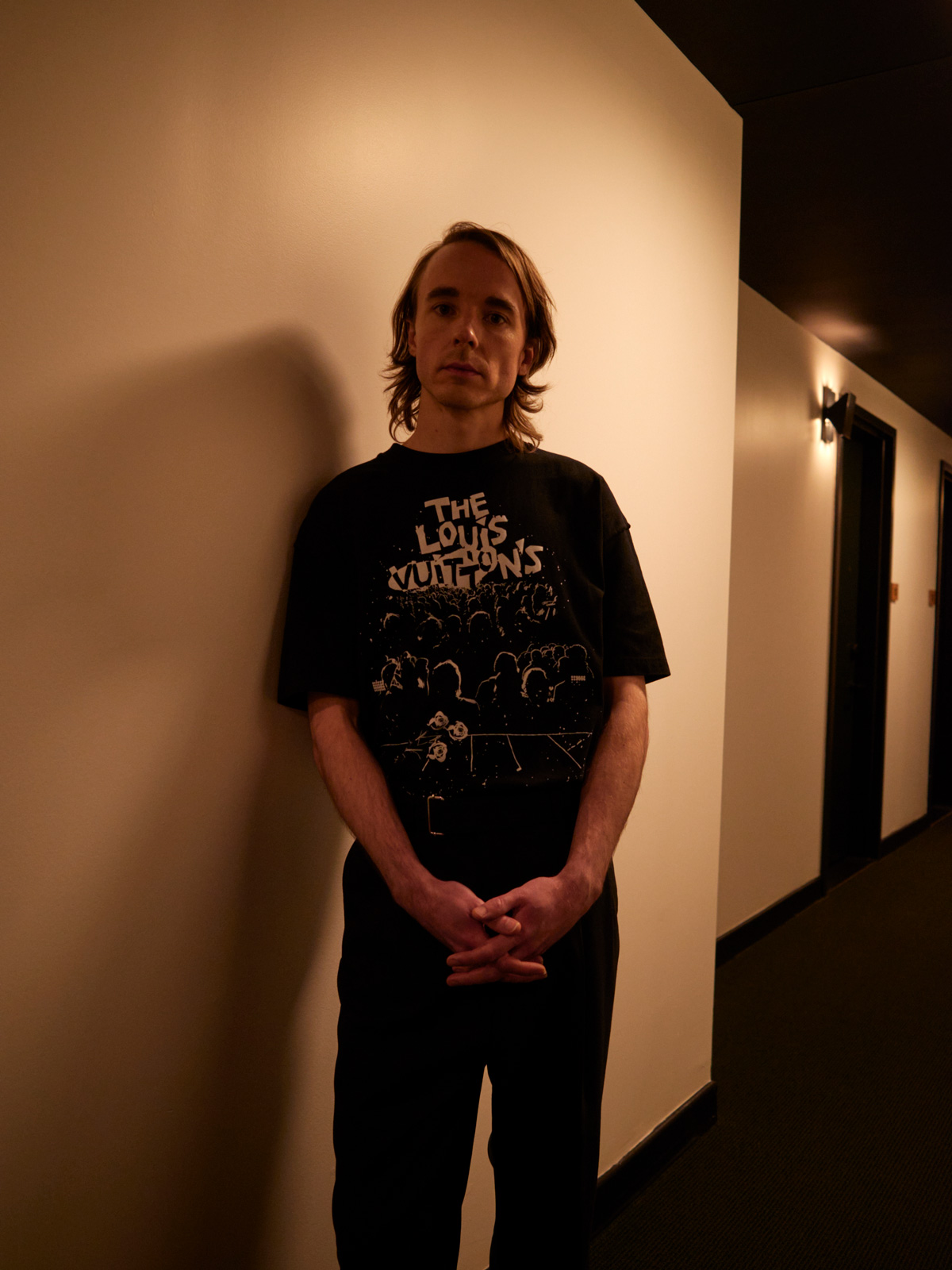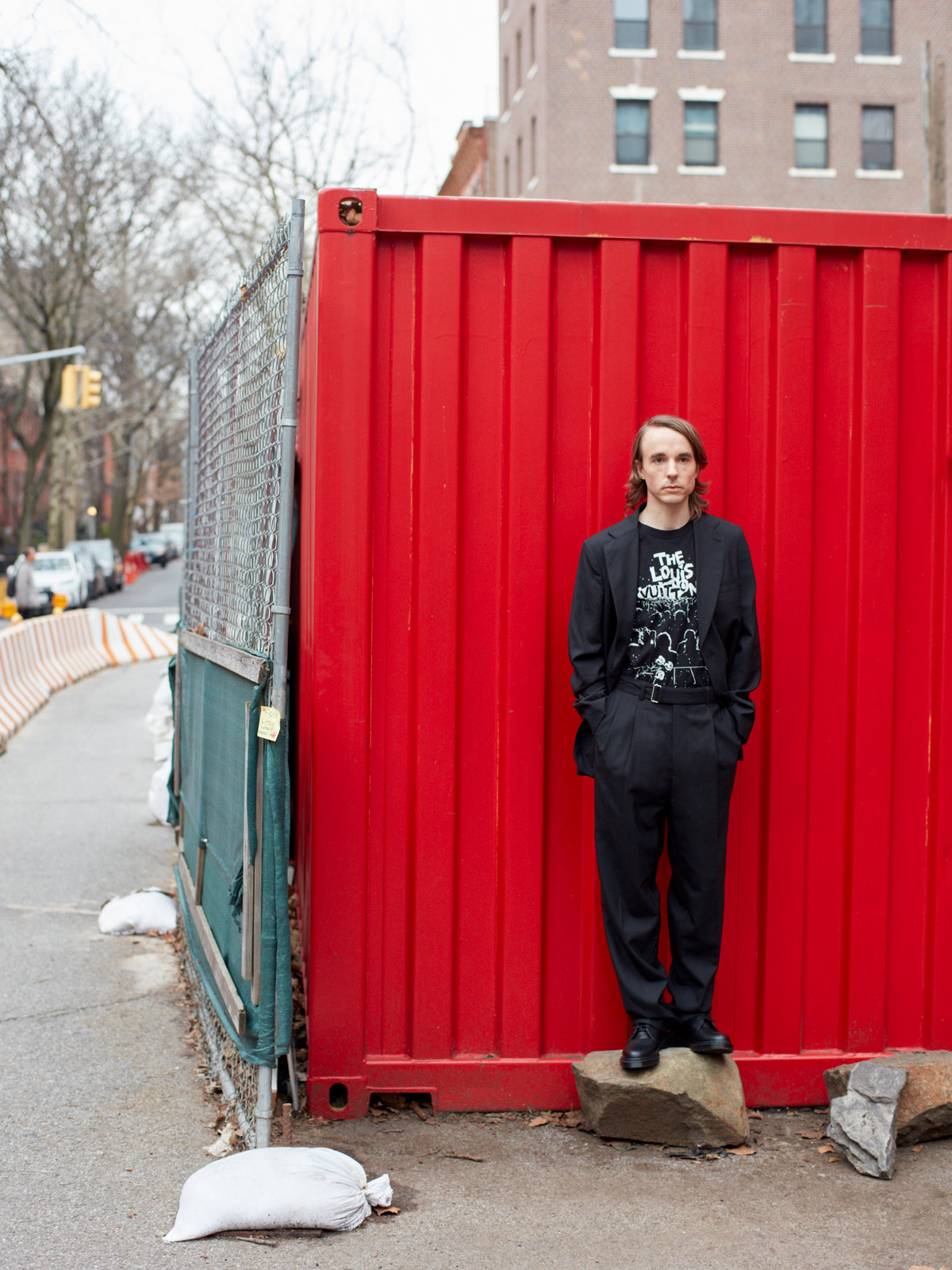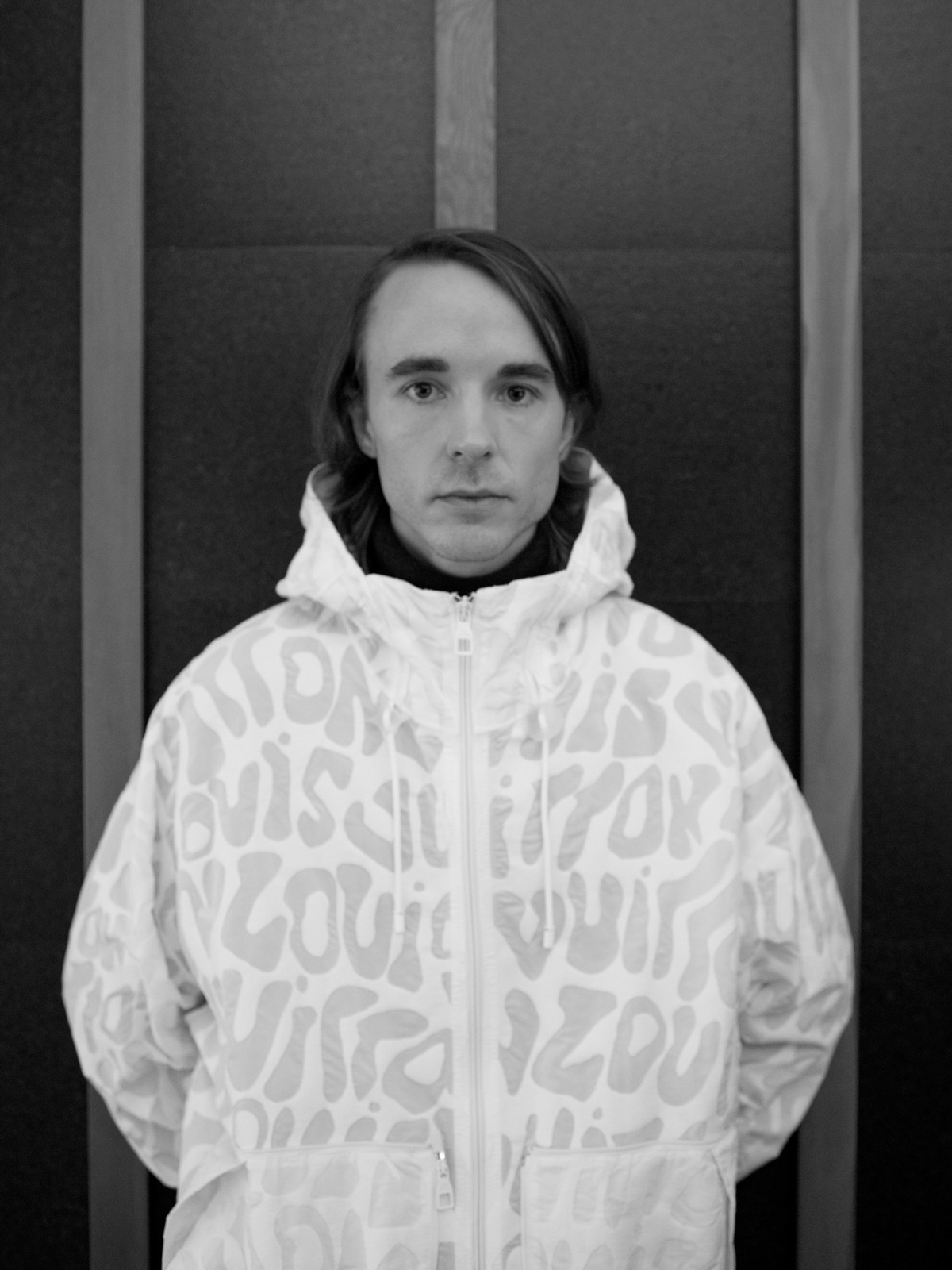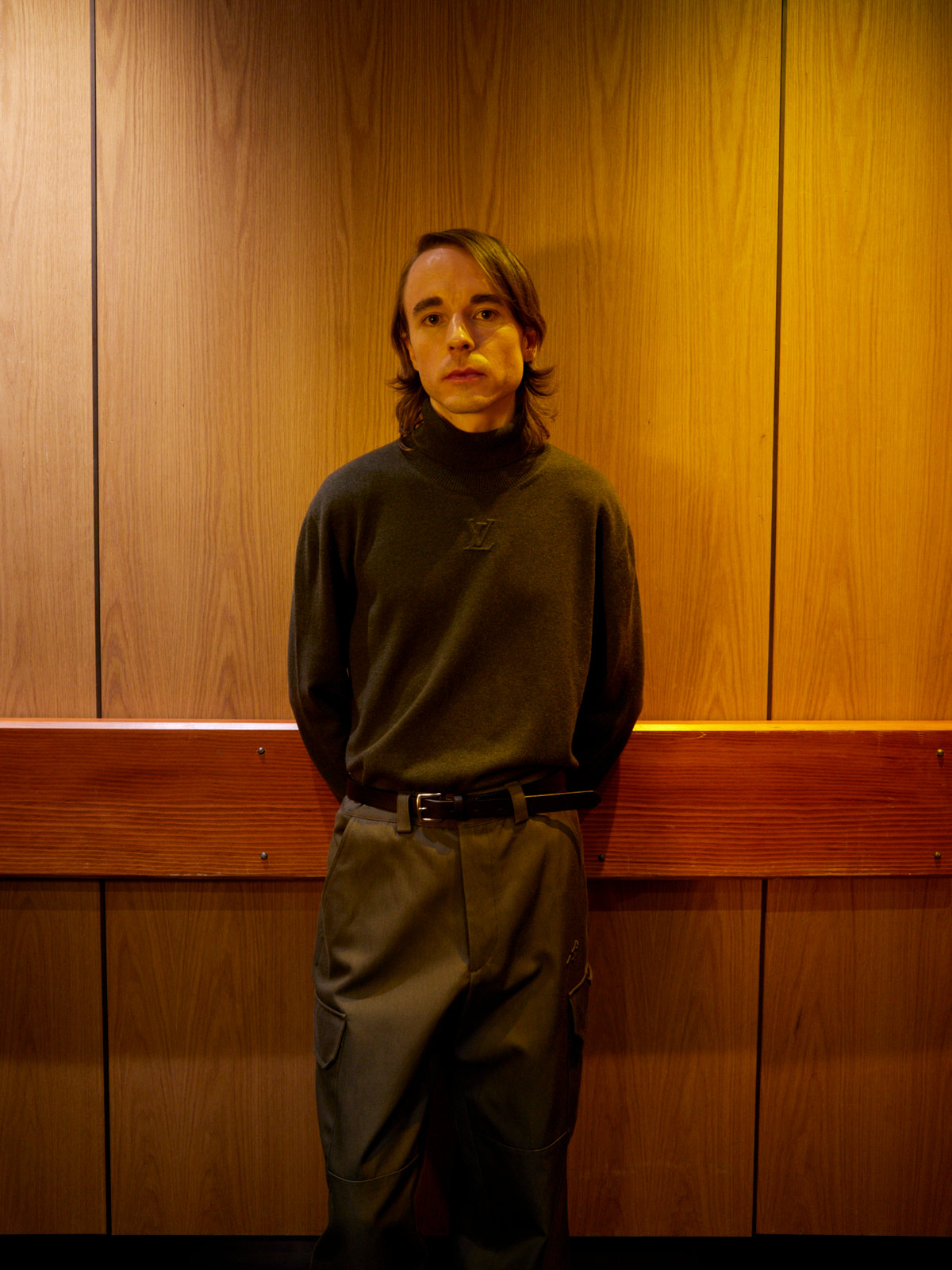On ‘Norm,’ the Canadian singer-songwriter uses fiction to tackle dark themes—leaving it to the audience to make their own conclusions
Andy Shauf doesn’t like to play God. It’s why he decided to play the janitor in “Wasted On You,” sweeping up after Jesus and his father in a tongue-in-cheek music video that playfully re-envisions God as someone who “doesn’t understand what love is”: a cartoonish character who muses over life’s big questions, without sparing much thought toward the answer.
It opens with God painting the world on his easel, as Jesus asks what happens to humans when they die. “Maybe eternal life / But only if they find me,” he responds offhandedly, more focused on his canvas than the question. “What if they never hear about you at all / Or what if they ignore you?” Jesus counters. “Would their fate be the same?” “Well yeah, I guess,” God says defensively, stepping back to admire his handiwork. Then an idea occurs: “Maybe I’ll send you down / Give them a clue,” he sings, “Then they’ll kill you.” Jesus’s face falls, but God continues, inspired: “And I will ask them / Was all my love wasted on you?”
The idea for the song arose after Shauf reread the Bible, and was struck by how God’s behavior could be seen as callous and self-serving—a contrast to the lessons he was taught as a child, growing up in a religious family in the small town in Saskatchewan. That’s not to say he’s entirely against its teachings: “I think it’s important that people have something bigger than themselves to believe in, even just for the sake of forcing you to have a little bit of compassion for others,” Shauf says, explaining that, rather than intending to criticize religion, he wanted to draw attention to the power of interpretation.
It’s a fitting theme with which to open Norm, an album that contrasts Shauf’s soothing voice and shimmering compositions with the darkness lurking just below its surface. “To create something with depth, you also need to create a surface level that people can engage with,” he says. “But the more time you spend, the more you start to understand the complexities. If you only listen once, you might think, ‘This is a really nice love song’—but if you pay attention to the lyrics, you’ll start to realize that something’s really wrong,” Shauf says, explaining that he wanted to make an album that changes with every listen, gradually revealing a dark undertone that’s not apparent on first blush.
One such example is the song “Telephone,” which appears, at first, to be written from the perspective of a man missing his lover—at least, until he recalls how the recipient of his calls used to hang up and look confused, before “[they’d] turn to close the blinds.” A similar darkness reveals itself in songs like “Paradise Cinema,” which recalls the plight of a character who “seems like he’s falling in love with every bright smile he sees”—an endearing premise, before the lyrics reveal that he’s watching his target cross the street, or else ducking beneath seats at the cinema to avoid her detection.
God’s earlier reprise—“Was all my love wasted on you?”—takes on a menacing significance when, minutes into our conversation, Shauf reveals the identity of the album’s narrator: not the shy, soft-spoken musician sitting in front of me at a hotel bar, but a character he devised named Norm, who reveals himself to be a stalker over the course of the album.
It’s not Shauf’s first foray into fiction. Rather than writing songs from his own perspective, he frequently invents characters through which to explore seemingly everyday experiences. Sometimes, his divergence from their personality is what inspires him. For instance, he hates talking on the telephone, so he challenged himself to embody the perspective of Norm, pining away as he waits for a call.
“It’s funny, because a lot of musicians write songs that are supposed to be interpreted as personal—but they’re not true at all, or they’re written by other people. In my case, I’m trying to write lies,” he says with a laugh. “But when I meet fans, they often assume my writing is autobiographical. People will ask things like, ‘Who’s Judy?’ and I’m like, ‘There is no Judy. Judy doesn’t exist.’”
In past concept albums, Shauf has addressed specific scenes and settings—from the anxiety-inducing nature of a house party, to the night-at-a-bar drama of his 2020 record The Neon Skyline. Shauf finds pleasure in writing about the little moments that make up our lives, stating that “if you try to write something that is tackling a big question, it can be too much too fast”—better to deliver profundity in bite-sized, sonically beautiful increments that add up to something greater than the sum of their parts.
“A lot of musicians write songs that are supposed to be interpreted as personal—but they’re not true at all, or they’re written by other people. In my case, I’m trying to write lies.”
Such is the case with Norm, an album that ironically arose from Shauf’s attempt to get away from his usual stylistic conceit. “I was like, I’m not going to write a concept record. I’m going to write a collection of songs, just like everybody else does. It’s going to be a normal record, so I thought, I’ll call it Norm.” But in no time, a character began to emerge—one that was, to Shauf’s surprise, more sinister than he could have imagined. Soon, he found himself tinkering with the lyrics, turning little details toward one another until a story began to take shape. It’s a shift that’s embodied sonically, too: As the true nature of the record’s narrative begins to unfold, its sound begins to change, with discordant notes and a slowing tempo acting as harbingers of the unease to come.
With this album, Shauf wanted to create a new sense of narrative space: a deliberately blank canvas onto which viewers could project their own perceptions, rather than delivering the conclusion with loose ends neatly tied. His choice was inspired, in part, by an experience he had watching the film Mulholland Drive. “There was this nearly static shot of a key sitting on a table, and I was watching for a minute. That became two minutes, then five minutes. I was like, ‘This must have been insane at the theaters—people would have been losing their minds!’” he says. “And then my browser crashed and I realized that the movie was just frozen.”
Shauf laughed at himself, but couldn’t stop thinking about the impact of those five incomprehensible minutes spent trying to figure out the motive behind the shot. “I was at the point in this record where I wasn’t sure how I was going to tie the story together, so that it would be easily understood by people,” he says. “And that experience made me realize that the scene freezing was no one’s intention, and I interpreted it as this amazing artistic thing.”
Shaud has found similar inspiration in the fiction of writers like Lydia Davis, Denis Johnson, and Randy Carter, saying that he likes to try to “figure out their tricks”—to get a glimpse at a creative process different from his own, and allow it to inform his writing. He’s also found reassurance in discovering the practice of the writer George Saunders, who allegedly composes stories in chunks—a nonlinear process that mirrors Shauf’s. “That’s the thing I read that most validated my own way of writing,” he says. “And that’s what I learned with this record: Just write until something lines up, and work with it until those things work together.”
Raised by the owners of a music store, Shauf plays every instrument on the album himself, experimenting until he finds what works. “It’s a really inefficient process! But it’s the only way I think I can get exactly what I’m hearing in my head, because when I work with other people, it’s always this compromise of meeting in the middle with an idea, their abilities, and my ‘controlling musical nature,’” Shauf says, miming air quotes.
It’s hard to imagine the soft-spoken Shauf approaching anything close to domineering—but, as he explains, part of the conflict is his willingness to do away with anything that isn’t just right. “Because messing up is part of my process, I’ve learned to just not be attached to ideas, and it’s really hard to navigate that when people do get attached,” he says. It’s part of the magic behind his music. Fans have described him as “the master of the perfect puzzle-piece song”: a rare instance in which “every little keyboard line [and] clarinet flourish is placed perfectly and with such intention,” as one YouTube commenter writes. “If you wanna know how to write a perfect song, just listen to Andy.”
Ironically, Shauf hasn’t always been comfortable being listened to. He got his start in music singing church music as a kid, drafted into his parents band. “They were the worship team leaders, and they needed a drummer. But growing up, I was always very shy, so I would play the drums really quietly and tentatively, like this,” he says, miming a timid drum hit. “The old people loved it when I played drums, because they could hardly hear it. They were like ‘All right!’” Shauf laughs. He was too shy to even sing the National Anthem in school, and would instead goof off or go intentionally off-key.
Having just crested his mid-30s, Shauf is well on the way to overcoming that instinct. “I’m getting older and realizing that I am who I am, and I don’t have to be ashamed of my inability to communicate, or whatever it is that makes me shy,” he says, recalling how in prior years, he had leaned on alcohol to overcome his social inhibitions, which he’s now quit. “It’s funny, but I’d heard a lot about how people become less self-conscious in their 30s, so as I approached mine I was just assuming that was going to kick in. But I’ve realized that there’s a lot of work that I actually need to do to get to the bottom of some of these things that are holding me back, and I’m now starting to make my way out of it,” he says.
Shauf appears to be coming into himself—a sense of newfound confidence that arose, in part, from learning to shake off the awkwardness of life, rather than dwelling on it. That’s not to say his personality has shifted completely; at an intimate pop-up show in Brooklyn, he tentatively flirts with the crowd, his apparent shyness contrasting with the rabid energy of his admirers. (When he asks what they want to hear, one girl screams, “Every song you’ve ever written!”) Blushing, Shauf offers to play some new music, “if that’s okay”—and the crowd goes wild as he introduces the first track of Norm. “This is a song about…” he says, then trails off, thinking better of it. “Well, you’ll see.”
Makeup Mical Klip. Photo Assistant Emlyn Mileaf-Patel. Stylist Assistant Noah Delfiner. Production Camera Club. Shot at Ace Hotel Brooklyn.


